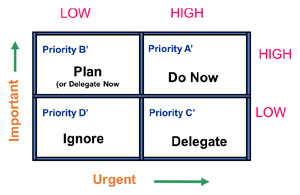The Objectives in Time Organization and its Management
George Natar – B.Sc, M.Sc, MCyHRMA – Certified Trainer and Business and Insurance Consultant
January 2023

As we have mentioned in our previous article, the insurance sector today faces many challenges. The resurgence of inflation, the return of superannuation, the stricter framework of legislation, the image of today’s insurer, all are affected causing a reduction in the quality of benefits and operations. New pandemic risks, cyber threats, and the impact of climate change are already having an impact on the magnitude and frequency of damage and consequential situations. But all of these are the real growth opportunities for the insurance sector, as customer power, along with the development of technology and shifting market boundaries, are driving the insurance industry into action. In a specific way, not with the “trial and error” system, nor by simply and casually reacting to what comes, and of course not by remaining apathetic.
Since ancient times, people have used proverbs to show how important a resource time is, with many meanings that are perhaps even more true today, when we are all running to do… more!
“Haste bakes the bread, but it doesn’t bake it well”, “Slowly the unripe becomes honey!”,
“The Jew walked in the bazaar, and it was Saturday”, “I was young and I was old”,
“He who hastens stumbles”, “The liar and the thief in the first year rejoice”,
“If you don’t sow in spring, you will reap in summer”.
and many other proverbs that tradition gives us lessons in managing our time. And the overall message is clear. Time needs a way to be used.
Time Organization or Management?
Let’s start with Chilon the Lacedaemonian, who said philosophizing about “Chronos Pheidos”, that is, to economize our time, or more specifically to spend it wisely.
The Organization of Time is always done in advance so that each interested party can lay the foundations, define the framework that can be used in a given period of time.
On the other hand, Time Management is always done in real time. To implement organization and planning or to react to the many contingencies that force us to reorganize?
Parkinson’s Laws
This law is the most basic in relation to our efficiency in performing a task as well as possible. The law states that “work expands to fill the time available for its completion,” meaning that the more time we spend in advance on a particular task, the longer it will take to complete it, even if it could have completed in a shorter period of time.
The Law of Insignificance: Why Do People Focus on Small Matters?
This law describes the phenomenon where people spend a relatively large amount of time, energy, and other resources dealing with relatively small and insignificant matters. We are afraid to deal with the important and productive parts of a job first, and in the end… we rush to do them as quickly as possible, and of course the quality will remain low
We all need to evaluate each task and compare it to productivity, and therefore to our profitability.
Analysis of time for organization
A day has 24 hours, which is 1,440 minutes or 86,400 seconds. How many tasks should we allocate within this time? What is certain is that the more time we let go unutilized, the less we manage to execute. Procrastination, as it is officially referred to, is the main trouble. And it’s all about us, no one else. Michael Althsuler always says “the bad thing is that time flies, but the important thing is that we are the pilots”.
Efficiency and Performance
Therefore, we come to two factors that essentially determine the best use of time. These are 1. Effectiveness, which is choosing the right moves within a period of time, and 2. Efficiency, which is making the right moves in the right way.
Effectiveness is achieved when we take advantage of Parkinson’s laws mentioned above. Efficiency, however, needs experience, repetition, aiming at improved practices. All this leads us to the two Kinds of Time: 1. The Real (Working Time) (how much I did) And 2. Elapsing Time (how much I didn’t do). The first is planned, but the second is the key to analysis and the way to be able to increase our efficiency, and then, given the experience we will gain, to finally become more efficient. This is the magic recipe, in theory always. It remains to put it into practice. How;
The ideal way to utilize time
 The way is specific. To plan our tasks early even if they need to change along the way, to organize our time by assessing what is most important, and to achieve our goals as early as possible. President Eisenhower, known as Ike, in the 1950s used the method shown in the diagram below. He divided his tasks into two axes, the important ones on one side and the urgent ones on the other, and by combining them he ended up in four categories.
The way is specific. To plan our tasks early even if they need to change along the way, to organize our time by assessing what is most important, and to achieve our goals as early as possible. President Eisenhower, known as Ike, in the 1950s used the method shown in the diagram below. He divided his tasks into two axes, the important ones on one side and the urgent ones on the other, and by combining them he ended up in four categories.
What was important and urgent he carried out immediately. The important things that were not urgent he planned for another period, and the urgent things that were not important to him he assigned and distributed to his confidants. This process is circular. The more we leave them undone, the more urgent and important they become, and therefore there are simply more things to do, and of course this also creates the problem of lack of time. Because we just can’t keep up.
Tips to properly organize your day!
We often hear the phrase from friends or colleagues, “I don’t have time”. What does this mean? Is there a very “heavy” schedule or a very poor organization of his day? Both constitute a problem, which we should not leave because it will surely burden us more over time.
Set priorities. The point is to initially focus on what is most important to us. All things have a cost and a benefit or profit that we receive. If we don’t put weight in our daily things, then we can’t start any planning. What do I do most often?
That I do something often means that I know it well and whenever I do it, I know that I do it well. We can transfer this element to our program (if possible) and thus gain flexibility. At the same time, it doesn’t get boring, there is rotation and interest.
Separate your personal life and “give” it time. Our family and relationships should be separated from work. Yes, we should go for a walk with a friend during the hours we can, but not “add” them to our schedule. They are friends, they are our family, they are our personal life. Start putting in your personal time for each day, but the best thing to do is not to follow a schedule there either. So it will be more restful, we will be more relaxed.
Planning means an agenda! Whatever you like, it’s important that everything is properly distributed and that we find it quickly. It is certain that we will forget something. That’s why we note, we are “bombarded” daily by information, our memory has its own limits!
Take out the ones that don’t offer you anything. There are hours that we spend for no reason. It would be good to put a measure on anything pointless we do, let’s use this time with friends it will be more creative. Maybe during the week, we don’t have time to see what we did wrong and what we did right. Sometime during the weekend when we are calm, we can think about what we did right and what we did wrong! If we can’t do it ourselves, let’s lead by example. There are friends, acquaintances or colleagues who catch everything. How do they do it to us? Have you ever wondered? Find your own way… That’s not all. We also have to think outside the box
Five tips for better organization of time
1. Set deadlines – You will be more productive if you set a specific date for the completion of the projects you undertake. The stress of time in this case helps.
2. Start with the hard part – Start with the hard part of your job. The longer you put it off, the harder it is to focus. Stop worrying more.
3. Few and good papers – The pile of notes and photocopies on your desk not only does not serve but also makes your life difficult. Organize your work material so you can find what you want right away.
4. The e-mail war – Every morning and afternoon take ten minutes to check your messages by phone and email. Delete the ones you don’t need and the ones you’ve already checked, lest you run into them again the next day and waste time. Don’t be tempted to check every now and then to see if you have a new message.
5. End of time – Close your computer every day thirty minutes before the time you have to leave. Use the half hour to organize your next day’s work. Grab your keys and leave just in time to wrap up your day. If you don’t, your employer won’t remind you.
Daily Management System
Set reminders for everything important
Break the task into manageable steps
Ignore distractions where you can
Focus only on the things that matter, even if they are the hard things
Organize your day early, even if it doesn’t go as planned
Write down your priorities, even if they change
Make a list of what you should… DON’T do
Check your emails only 2 times a day
Take short breaks and refresh your mind often
“W”: – Write down on a clean page…
What am I going to do …
today… ______________
tomorrow… ______________
in a week… ______________
in a month… ______________
in a year… ______________
